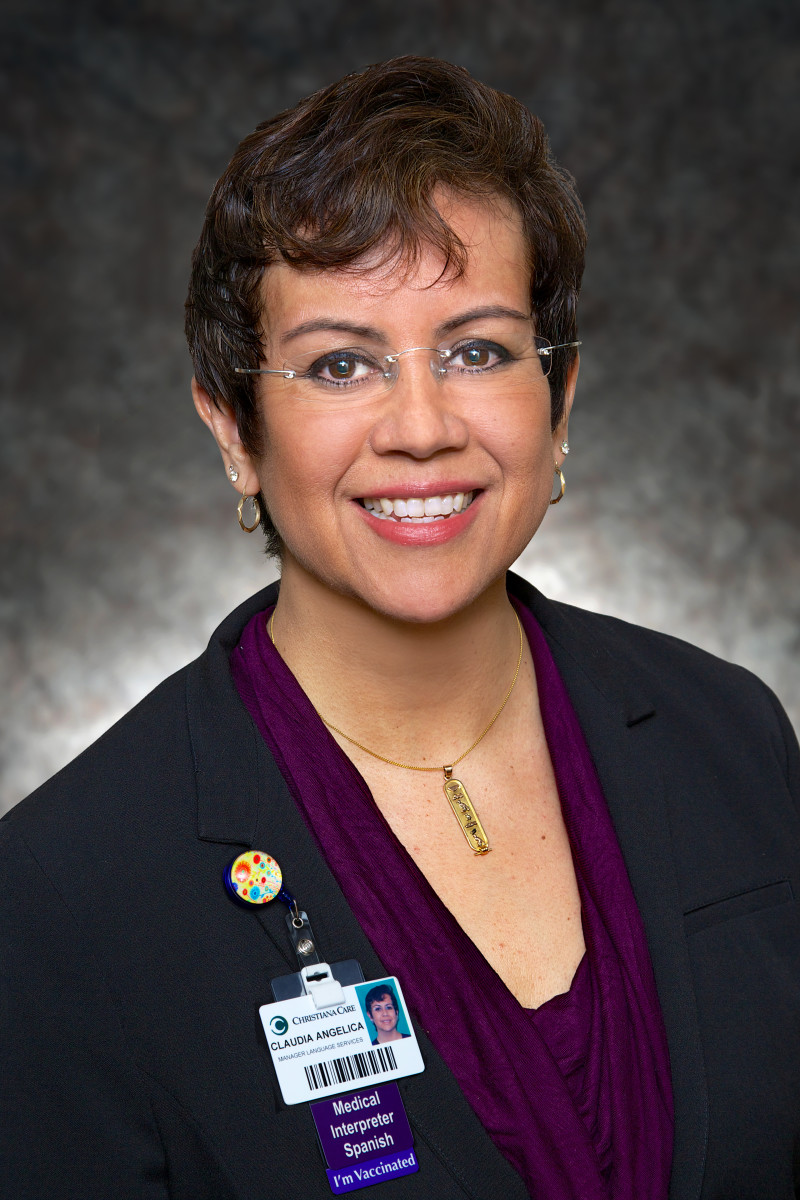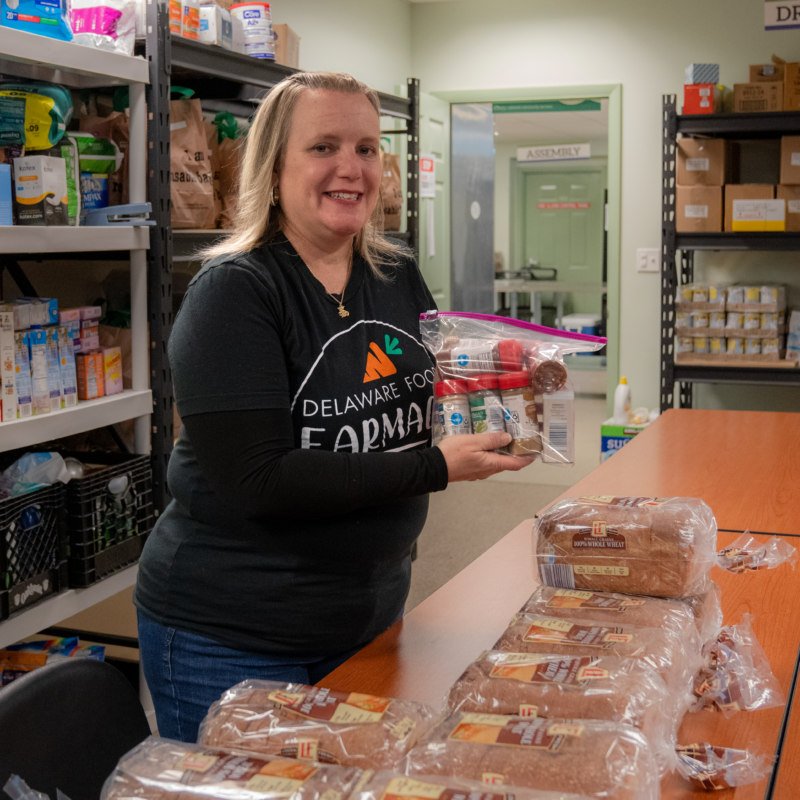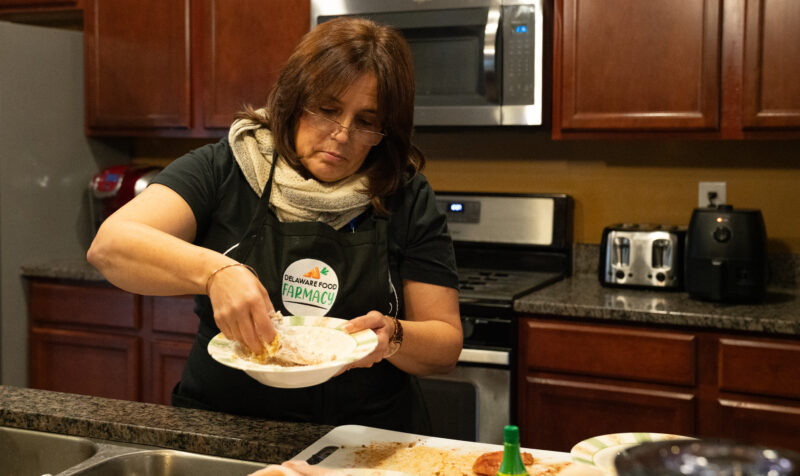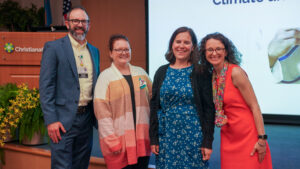For years, Erica Lingerman struggled without success to get her type 1 diabetes under control. She suffered through bouts of shakiness, exhaustion, excess water retention and an overall feeling of being unwell – until her symptoms reached a life-threatening peak in 2022 when she wound up in a coma.
When a ChristianaCare nurse in her endocrinologist’s office suggested the Delaware Food Farmacy, Lingerman gave it a shot. She knew the weekly supply of groceries would help her family eat healthy, but what she appreciated most was the one-on-one support she received from community health worker Michelle Torres, BBA-HM.

“She was a great educator for me — she not only checked on me but kept me going with her ideas and tips. I knew how to cook, but I did not know how to incorporate grains and breads in a healthy way,” said Lingerman, who lost 31 pounds and improved her 1AC during the six-month Food Farmacy program.
In our series Food as Medicine, we follow how ChristianaCare is making food a prescription in a healthy lifestyle.
Click here for Part 1: ‘It’s Not Just About Food–It’s About Friendship.’
Click here for Part 2: Farm-to-Table Where It’s Needed Most
“Thanks to Michelle, I learned how to season things and still be healthy.”
Now living in Collingdale, Pennsylvania, Lingerman has lost a total of 105 pounds in recent years, including another 20 pounds after graduating from the Delaware Food Farmacy in September 2023. Just as importantly, she has kept her diabetes under control, reduced her insulin intake by half and eliminated other medications completely.
But even she was surprised by her own progress when she and her husband took a long walk on the beach together – something she wasn’t able to do when they married in 2022.
“I wake up and I don’t feel horrible. I have energy to go do things. I don’t have to stop and take breaths while walking,” she said.
Making a change
Since launching in 2021 as a partnership with ChristianaCare and Lutheran Community Services, Delaware Food Farmacy has graduated about 150 graduates from the six-month program. Participants have reported lower A1C blood glucose levels, healthier blood pressure readings and lower body mass index, said Michelle Axe, MS, CHES, program manager of Food and Social Care Initiatives for ChristianaCare.
“We’re offering participants an opportunity to make a change in their life, not only for them as individuals, but for the entire family,” Axe said.
Participating in the Delaware Food Farmacy
Health care providers can refer Medicaid-eligible patients with uncontrolled hypertension, diabetes and congestive heart failure into the six-month program.
It’s those life-changing successes that keep Michelle Torres a fervid evangelist in the Food Is Medicine movement. She’s hopeful one day that private insurances will cover the cost of “nutrition prescriptions” to help people adopt healthier habits.
“I want them to understand that this is not just about getting food. It’s a combined work between the physician, dietician and the patient working together,” Torres said. “Everyone deserves to love what they eat.”
Healthy eating from the very start
As a result of its success, Delaware Food Farmacy is expanding its program to include pregnant patients at the Center for Women & Children’s Health who are Medicaid-eligible and at increased risk for serious preterm health complications.

“Everyone deserves to love what they eat.”
The expansion is made possible by $900,000 from the federal Community Project Funding/Congressionally Directed Spending program secured by Delaware’s congressional delegation in the Fiscal Year 2023 appropriations package.
This program incorporates the Mediterranean diet, which is made up of leafy green vegetables and healthy fats and has been found to lower the risk of pre-eclampsia for at-risk patients and low birthweight for babies.

“Many studies have shown that eating a healthy diet, particularly early in pregnancy, leads to lower rates of preterm birth and preeclampsia. We know that about 20% of our pregnant moms report food insecurity,” said Matthew Hoffman, M.D., MPH., the Marie E. Pinizzotto, M.D., endowed chair of Obstetrics and Gynecology for ChristianaCare.
“This program lets us bridge this gap and support our patients and their families.”
¡Buen provecho!
Additionally, a 2023 grant from the Highmark Delaware BluePrints Program is enabling the program to be more culturally responsive to the Hispanic community – who make up 18% of ChristianaCare’s patient population – by providing updated and translated program messaging, recipes, cooking videos and menu adaptations.
“It meant a lot to be able to have the mix of culture in my family and cooking the food we like — but doing it healthier.” — Michelle Torres
To help in this endeavor, members of the Delaware Food Farmacy team sought input from the ChristianaCare Voicing All Latin American Experiences (VALE!) employee resource group. VALE! group members reviewed recipes, offered ingredient suggestions and recommended ways that the program could better reflect cultural diversity and increase trust among Spanish-speaking populations.

For caregivers in VALE! it was another way to put two of ChristianaCare’s values and behaviors into action: embracing diversity and committing to being exceptional today and even better tomorrow, said Claudia Angelica Reyes-Hull, MArch, CMI, CHI, manager of Cultural and Linguistic Programs for the Office of Health Equity.
“You work here but you’re also part of a community that is underserved, so you can actually make an impact just giving your opinion,” said Reyes-Hull.
On a personal mission
For Torres, healthy eating is more than a professional calling — it’s also personal.
“My father was diagnosed with type 2 diabetes back in the early 2000s. I remember him coming up to me and saying, ‘Help me,’ ” she said.

As Torres taught her dad how to enjoy the staples of the family’s Puerto Rican culture without impacting his health — substituting brown rice for white, adding more vegetables to his plate and using a measuring cup to better approximate servings — her siblings took notice.
“They were the ones who used to joke about the food I would bring to family events. But seeing my father transformed before our eyes made all my siblings follow along,” Torres said.
“It meant a lot to be able to have the mix of culture in my family and cooking the food we like — but doing it healthier. That’s what makes me so passionate about this.”

Recipe for success: Community Health Worker Michelle Torres demonstrates that healthy food can taste good.
Torres has been known to join her Delaware Food Farmacy patients at the gym, in the grocery store, at the doctor’s office — anywhere they need her to be. And while good health and nutrition are her guiding lights, taste and fun matter, too.
She celebrates when patients tell her about their improved blood glucose levels, how they walked around the block for the first time in years or made their first batch of slow cooker chili — using her DASH-approved recipe, of course.
“There are always some patients who are nervous about making this type of change. And I tell them that’s why I’m here with them,” Torres said.
“By the time the six months is over, they don’t want to leave because they know how to really maneuver in the kitchen. They’re enjoying what they’re making. They’re using the ingredients properly so they get that good taste out of their food. And it makes all the difference.”



